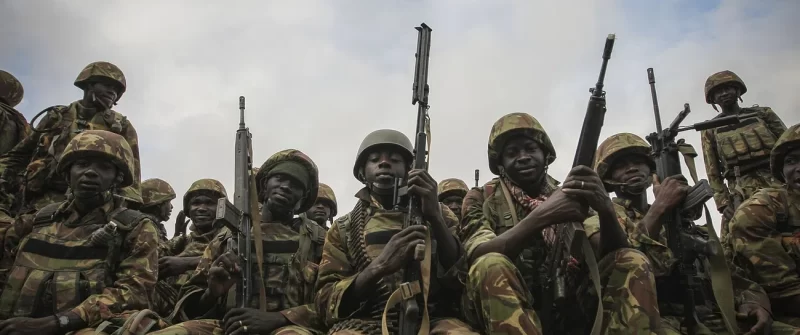Since April 2023, major conflict has been ongoing across Sudan between the (largely Arab) Rapid Support Forces (RSF) and the Sudanese Armed Forces (SAF). Over 14,000 people (many civilians) have been killed, and about 9 million forced from their homes as internally displaced people (IDPs). About 5 million civilians are on the verge of starvation, and the UN reports nearly 25 million are in need of some sort of humanitarian aid. Fighting started around Khartoum, but has spread elsewhere, including to the ethnically tense region of Darfur.
Fighting has increased sharply in North Darfur over the last three weeks. The RSF launched a fresh attack on the SAF-controlled city of El Fasher on 10 May, and fighting in the city remains heavy.
El Fasher was previously a safe haven for IDPs in Darfur, and recently hosted a SAF garrison, making it one of the last major urban centres in Darfur to remain under SAF control, hence its attraction to the RSF.
The RSF is besieging the city, bombarding it from three sides, and has blocked supply routes, leaving residents without food, medicine, and access to humanitarian aid from outside.
Many thousands of IDPs have sought shelter in El Fasher, particularly in the Abu Shouk refugee camp, which hosts civilians still suffering from the conflict in the 2000s. However, it is close to the front line, and has received heavy artillery fire that has killed hundreds. Local residents are now trying to move again, but are being prevented from leaving the city by the RSF checkpoints ringing the area.
The RSF has been accused of deliberately targeting civilian areas of the city – residential areas, markets and medical infrastructure have been engaged with artillery. Hospitals are reporting hundreds of civilian casualties, including women, children and the elderly.
The humanitarian situation will certainly deteriorate in the coming weeks. The rainy season begins in June: this could cut off communities further, and will spread serious infections, particularly amongst the malnourished. At the same time, the Sudanese “lean season” (between harvests when stocks are low) also begins in June, and will likely last longer this year given the limited harvests in 2023. To make matters worse, the main hospital in El Fasher has now likely run out of supplies.

The RSF was formed largely from the Janjaweed, the ethnic Arab militia that fought against non-Arabs in the previous Sudan conflict in the 2000s. As the current fighting has spread into Darfur it has taken on a fresh inter-ethnic dimension, and there are fears that it will replicate the genocide experienced in Darfur in the early 2000s.
The RSF has been accused of committing atrocities against non-Arab communities in each of the major cities it has overtaken, with El Fasher just the latest. According to Human Rights Watch (HRW), the RSF is deliberately starving the town in a region experiencing one of the world’s worst famines.
El Fasher is being defended not just by the SAF, but by non-Arab rebel militias, comprised primarily of the black ethnic Zaghawa people who live across Darfur, Chad and Libya, and who have conducted their own killings against Arab civilians in Darfur. These Zaghawa communities will find themselves at risk of deadly reprisals if the RSF finally seizes the city.
In El Geneina (West Darfur) last year, HRW accused the RSF and its Arab allies of killing up to 15,000 local ethnic Masalit (and other non-Arab) people in a systematic campaign of ethnic cleansing, something that the RSF has denied. The current fighting in El Fasher is increasing concerns that there will be some kind of repeat of this historic incident.
The simmering ethnic tensions between conflicting groups will result in the conflict lasting for a much longer period of time than any civil conflict elsewhere. The violence between the Arab and non-Arab communities will, as in 2003, most likely become genocidal if the international community is unable to provide a peacekeeping force to the area. Travellers to Darfur should consider their vulnerability to artillery bombardments and small arms, their exposure to diseases spreading in a malnourished environment, and their access to supplies in an area where roads are blocked and humanitarian aid is deliberately hindered.
Leave a comment below or ask us directly. For more information on our bespoke risk management services, book a call today. Order custom analyst papers like our Traveller Insight to stay informed and ahead of the curve.